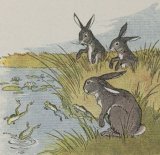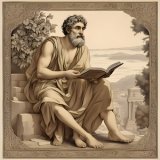The Hares and the Frogs
"The Hares and the Frogs" is a short fable by Aesop that delivers a powerful message about perspective and fear. In this tale, a group of hares, overwhelmed by their own fears and anxieties, decide to drown themselves. As they run to a pond to carry out their plan, they scare off some frogs who were sitting by the pond. Seeing the fear in the frogs, the hares realize that there are others who are more fearful than them, and this revelation gives them the courage to continue with their lives. The story emphasizes that no matter how bad a situation may seem, there is always someone who could be in a worse predicament.
Hares, as you know, are very timid. The least shadow, sends them scurrying in fright to a hiding place. Once they decided to die rather than live in such misery. But while they were debating how best to meet death, they thought they heard a noise and in a flash were scampering off to the warren. On the way they passed a pond where a family of Frogs was sitting among the reeds on the bank. In an instant the startled Frogs were seeking safety in the mud. "Look," cried a Hare, "things are not so bad after all, for here are creatures who are even afraid of us!" However unfortunate we may think we are there is always someone worse off than ourselves.
Translation
Translate and read this book in other languages:
Select another language:
- - Select -
- 简体中文 (Chinese - Simplified)
- 繁體中文 (Chinese - Traditional)
- Español (Spanish)
- Esperanto (Esperanto)
- 日本語 (Japanese)
- Português (Portuguese)
- Deutsch (German)
- العربية (Arabic)
- Français (French)
- Русский (Russian)
- ಕನ್ನಡ (Kannada)
- 한국어 (Korean)
- עברית (Hebrew)
- Gaeilge (Irish)
- Українська (Ukrainian)
- اردو (Urdu)
- Magyar (Hungarian)
- मानक हिन्दी (Hindi)
- Indonesia (Indonesian)
- Italiano (Italian)
- தமிழ் (Tamil)
- Türkçe (Turkish)
- తెలుగు (Telugu)
- ภาษาไทย (Thai)
- Tiếng Việt (Vietnamese)
- Čeština (Czech)
- Polski (Polish)
- Bahasa Indonesia (Indonesian)
- Românește (Romanian)
- Nederlands (Dutch)
- Ελληνικά (Greek)
- Latinum (Latin)
- Svenska (Swedish)
- Dansk (Danish)
- Suomi (Finnish)
- فارسی (Persian)
- ייִדיש (Yiddish)
- հայերեն (Armenian)
- Norsk (Norwegian)
- English (English)
Citation
Use the citation below to add this book to your bibliography:
Style:MLAChicagoAPA
"The Hares and the Frogs Books." Literature.com. STANDS4 LLC, 2025. Web. 22 Feb. 2025. <https://www.literature.com/book/the_hares_and_the_frogs_2310>.








Discuss this The Hares and the Frogs book with the community:
Report Comment
We're doing our best to make sure our content is useful, accurate and safe.
If by any chance you spot an inappropriate comment while navigating through our website please use this form to let us know, and we'll take care of it shortly.
Attachment
You need to be logged in to favorite.
Log In